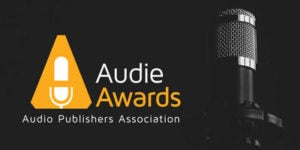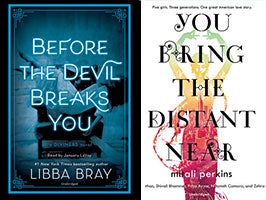Amanda is a longtime audiobook advocate, leading innovative efforts to spread the word about audio through regional and national awareness campaigns. Her audio career has spanned the Harry Potter series, audiobooks from three U.S. Presidents, and bestsellers by John Grisham, George R.R. Martin, Rick Riordan, and Paula Hawkins.
Dan has spent his entire twenty one-year career in the audiobook industry. The creative catalyst for over 2,000 audio productions, he has collaborated with bestselling authors, notable celebrities, and award-winning narrators as well as former U.S. Presidents Bill Clinton and George W. Bush. Sixteen of his recordings have been nominated for Grammy Awards, with two of these recordings winning the award for Best Spoken Word Album. He is also the creator of Ahab.us, a casting website launched in 2015.
Penguin Random House Audio includes four audiobook imprints: Random House Audio, Penguin Audio, Books on Tape, and Listening Library – the latter being the oldest audio imprint, founded in 1955. They released more than 1,300 audiobooks in 2017 and there are more than 12,500 audiobook catalog titles.
Amanda noted that beyond Dan and herself, the Penguin Random House Audio leadership team features colleagues
Sue Daulton, Vice President, Operations;
Heather Dalton, Vice President, Marketing;
Amy Metsch , Vice President, Associate Publisher; and
Katie Punia , Vice President, Publicity.
Looking at the global audiobook marketplace – from new frontiers to emerging and mature markets –Audible (Amazon) is the biggest digital audiobook distributor, with Google and Apple also having a big presence, along with Storytel (major streaming service in the Nordic countries), as well as Baker & Taylor, Overdrive, B&N’s Nook, and Follett, among other companies.
“Physical CD sales continue to be solid, but the audiobook growth story is digital,” Amanda said. “Smart phones have sparked the rise of downloadable audiobooks, as has the popularity of podcasts and development of smart speakers. Nearly a third of Americans now have smart speakers. It has become a ‘family device.’ There are some families who gather around smart speakers to listen to audiobooks like people in the pre-television era used to huddle around console radios to listen to favorite programs.”

Who listens to audiobooks? Amanda presented the demographics: 28%: ages 30 to 44; 24%: ages 18 to 29; 19%” ages 45 to 54; 15% ages 55 to 64; 14%: age 65 and older. “So more than half of audiobook listeners are under 45,” she pointed out.
Where do people listen to audiobooks? A national survey found: 32% listen while commuting; 34% at home; 17% while walking; 17% while cooking or doing arts & crafts.
Delving inside the production of audiobooks, Dan revealed that “last year PRH Audio recorded 24,000 raw hours and 9,700 edited hours, at our 15 recording studios on both coasts. We have 13 audiobook producers and 8 pre/post production producers.”
“Before producing, we actually read the books,” Dan said, “and we contact the authors to discuss production ideas, and talk about casting. If an author wants to read their own book, we try to make them aware of the commitment they will be making, both physically and in terms of their schedule. Bottom line, we want the author to be happy and we want to create the best possible listening experience for the consumer. We have a long list of exceptional voice talent, but we work closely with talent agencies to find new and appropriate talent. George Saunders’ LINCOLN IN THE BARDO, with 166 different character voices, was such a unique production and a good example of one that showed how elaborate the casting of a book can be.”
Dan stressed, “Ensuring the quality of audiobooks is so important. If a consumer has one bad audiobook listening experience, they won’t come back to the format. Before the audiobook master is finalized, we listen to every word with our quality control team. One wrong voice in one sentence can ruin it all. Regional accents must be authentic. A lot of research is done to make sure we get it right – even to the point of going to the region and getting samples from locals. We sometimes call local libraries to confirm pronunciations of towns, and things like that.”
While most audiobooks are direct readings of the print editions, some titles can be quite different. Dan shared an example of how comedian Tracy Morgan, rather simply read his book, took home a narrative outline, came back the next day, and told alternate stories in the studio based on themes and people covered in his book. “He created a unique, emotionally powerful listening experience,” Dan said.
For “further listening,” Amanda and Dan recommended accessing PRH Audio audiobooks titles via the
Volumes app and checking out
“This Is the Author” podcasts, with more than 200 episodes offering behind-the-scenes insights into the audiobook recording process.
 Penguin Random House Audio, voted the inaugural winner of the Audiobook Publisher of the Year prize at the 2018 London Book Fair International Excellence Awards, was front and center at last month’s packed “Lunch & Learn” session featuring Amanda D’Acierno, Executive Vice President and Publisher, and Dan Zitt, Vice President of Content Production. Introduced by Penguin Publishing Group President Allison Dobson, Amanda and Dan shared insights into the world of audiobooks – a publishing category on an upward swing; the inner-workings of Penguin Random House Audio; and career highlights.
Penguin Random House Audio, voted the inaugural winner of the Audiobook Publisher of the Year prize at the 2018 London Book Fair International Excellence Awards, was front and center at last month’s packed “Lunch & Learn” session featuring Amanda D’Acierno, Executive Vice President and Publisher, and Dan Zitt, Vice President of Content Production. Introduced by Penguin Publishing Group President Allison Dobson, Amanda and Dan shared insights into the world of audiobooks – a publishing category on an upward swing; the inner-workings of Penguin Random House Audio; and career highlights. The Audio Publishers Association has announced additional 2018 Audie Awards finalists, including for its Audio Book of the Year honor, recognizing LINCOLN IN THE BARDO by George Saunders, narrated by George Saunders, Nick Offerman, David Sedaris, and 163 other voices (Random House Audio). LINCOLN IN THE BARDO is also nominated for Excellence in Production; and Penguin Random House Audio’s “Transform Your Commute” campaign is up for the Excellence in Marketing award.
The Audio Publishers Association has announced additional 2018 Audie Awards finalists, including for its Audio Book of the Year honor, recognizing LINCOLN IN THE BARDO by George Saunders, narrated by George Saunders, Nick Offerman, David Sedaris, and 163 other voices (Random House Audio). LINCOLN IN THE BARDO is also nominated for Excellence in Production; and Penguin Random House Audio’s “Transform Your Commute” campaign is up for the Excellence in Marketing award.  The Audio Publishers Association has announced its 2018 Audie Awards finalists, including 12 Penguin Random House Audio titles. This year’s honorees were revealed via a social media campaign, with each category’s finalists announced by a notable author, narrator, or media outlet. Three PRH Audio authors nominated this year participated in the announcement. George Saunders revealed the Short Stories/Collections category on his Facebook (30.21K followers), John le Carré revealed the Mystery category on his Twitter (6.4K followers), and Libba Bray revealed the Middle Grade category on her Twitter (55.8K followers).
The Audio Publishers Association has announced its 2018 Audie Awards finalists, including 12 Penguin Random House Audio titles. This year’s honorees were revealed via a social media campaign, with each category’s finalists announced by a notable author, narrator, or media outlet. Three PRH Audio authors nominated this year participated in the announcement. George Saunders revealed the Short Stories/Collections category on his Facebook (30.21K followers), John le Carré revealed the Mystery category on his Twitter (6.4K followers), and Libba Bray revealed the Middle Grade category on her Twitter (55.8K followers). 







